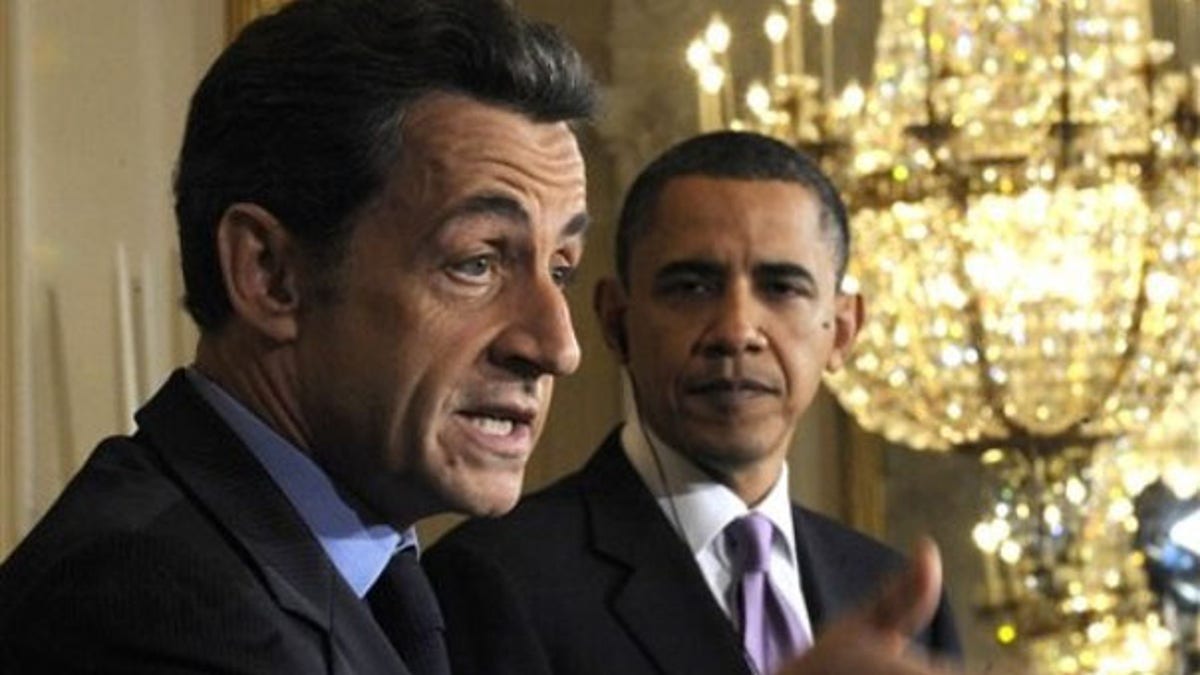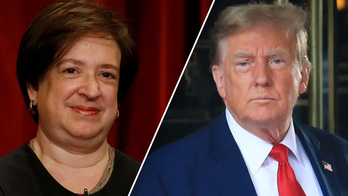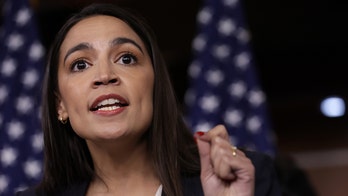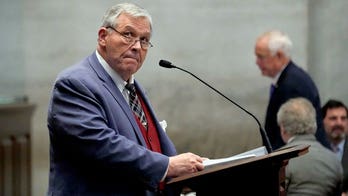
Mar. 30: French President Nicolas Sarkozy speaks as President Obama listens at the White House. (AP)
Did it really happen, right there in the East Room? Could such a question be asked just one year after a nearly rapturous Europe welcome to President Obama and his promised era of engagement and mutual cooperation? Could Obama's word actually be a topic of debate among Europe's top leaders?
It appears so.
French President Nicolas Sarkozy was asked to elaborate on his Tuesday comments in New York that the world needs an America "that listens."
Instead of explaining whether America listens, Sarkozy talked about what happens when Obama speaks -- denying a problem no one asked about -- and in so doing revealed a surprising rift in U.S.-European relations.
"I speak on behalf of Chancellor Merkel or Gordon Brown and other leaders," Sarkozy said, doing something world leaders seldom do -- speak for others. "Because President Obama, when he says something, keeps his word. His word is his bond. And that is so important. There's a joke among us, we don't like surprises. Well, from that point of view, there's no surprises. When he can, he delivers. When he can't, he says so."
But experts say there have been surprises, unpleasant ones for Europe.
"Europe is beginning to feel a little concerned that it's being taken for granted," said Heather Conley, director of the Europe program at the Center for Strategic and International Studies. " When summit meetings are skipped, when it takes 14 months for the French to have an Oval Office meeting, they are starting to become concerned that maybe allies aren't as appreciated as they had anticipated from this administration."
There are other grievances. European leaders felt cut out of the side-deal Obama cut at the Copenhagen climate talks, depriving them of co-negotiating clout on an issue Europe believes it has defined for more than a decade. France wants less pressure to send more troops to Afghanistan and more action on sanctions against Iran. France also wants what it considers to be a fairer shot at the contract for airborne refueling tankers on behalf of its government-backed aircraft maker Airbus and its U.S. partner Northrop Grumman Corp. Great Britain sees its "special relationship" with the U.S. as a thing of the past. England, Germany and France want more U.S. muscle behind their push for tougher global financial regulations.
Satisfaction has been hard to find.
"The call from Europe that youre hearing is 'C'mon America we need you we need you now more than ever,'" Conley said. "We need allies and this is a value-based partnership. You're starting to hear concerns that 'Well this values question, you know, we need to do more work and be more transactional in nature.' Well, the values proposition is at the center of the U.S.-European relationship and if that begins to shake the whole relationship begins to shake."
It is perhaps more than mildly revealing that before Sarkozy could answer whether Obama listened, the U.S. president interrupted.
"Let me answer the second question, even though that was to Nicolas" Obama said. "I listen to Nicolas all the time. I can't stop listening to him."
But to what purpose?
Clearly, whatever the amount of listening, the level of consultation and agreement is decidedly less than a year ago. One on need compare Sarkozy's take on Obama's America now and a year ago.
"We cannot afford to have the world's number one power not being open to the rest of the world," Sarkozy said Monday at Columbia University. "The world does not stop at the East Coast, the world does not stop at the West Coast."
In early April, in Strasbourg, Germany, Sarkozy said just the opposite.
"It feels really good to be able to work with a U.S. President who wants to change the world and who understands that the world does not boil down to American frontiers and borders," Sarkozy said.
"What Sarkozy is saying is 'Perhaps American listens, but it doesn't consider enough, before we even get to the question of whether we agree or not," said Michael Rubin, resident scholar at the American Enterprise Institute.
Rubin said the strain in U.S. relations with Europe is emblematic of difficulties elsewhere - namely in Israel, Asia and South America.
"From an Israeli perspective, the president is acting more like a zoning board member than as the the leader of the free world," Rubin said, referring to the current fight over Israeli settlements in East Jerusalem. "When it comes to trade, I just returned from South Korea and we have the case in Colombia too where the president doesn't seem to even want to listen to the history of diplomacy with our allies and the importance of free trade. Unfortunately, we're in a dynamic now where it pays much more to be a rogue regime than it does to be an ally of the United States."
Obama regards the new Israeli settlements as an impediment to peace talks with the Palestinians and feels duty-bound to confront the issue to maintain credibility with Palestinians and the Arab nations Obama's lobbied to back his approach to the peace process. Obama's also talked more openly about expanding trade, even as the South Korea and Colombia free trade deals remain stalled, a victim of White House inaction.
"The United States is getting a reputation basically of a country that cannot be trusted for more than 5 minutes at a time," Rubin said. "And that's not the way to build a healthy, stable world."
Iran could emerge as the issue that most tests Obama's commitment to engagement and realism.
Despite increasing evidence of Iran pursuit of nuclear weapons and ballistic missle technology, Obama on Tuesday repeated that Iran still had time make a lucrative deal with the West.
"The door remains open, if the Iranians choose to walk through it," Obama said. "But they understand very clearly what the terms of a diplomatic solution would be."
It's an issue Sarkozy pushed Obama on in their Oval Office meeting, administration officials confirmed.
"Sarkozy is actually growing increasingly impatient with the slow pace of getting an enhanced pkg of sanctions," Conleys said. "In February, the French presided over the Security Council and the thought was that that was the best moment to push for some robust sanctions. It didn't happen. They're regrouping now. Sarkozy is going to push Obama to get as much forward progress on those sanctions against Iran."
Rubin, like other conservative critics of Obama's approach to Israel on the settlements issue, sees an imbalance in the White House's conspicuous effort to deny Israeli Prime Minister Netanyahu a photograph or press conference last week while still holding out the hope of compromise with Iran.
"Rogue regimes don't look at diplomacy as a means of conflict resolution," Rubin said. "They look at diplomacy as a means of asymetrical warfare. Often times, they're playing chess, we're playing checkers and they're running circles around us."
On sanctions against Iran, Obama could only offer the "hope" of action.
"My hope is that we are going to get this done this spring," Obama said. " I'm not interested in waiting months for a sanctions regime to be in place, I'm interested in seeing that regime in place in weeks Do we have unanimity in the international community? Not yet. And that's something that we have to work on."
Based on Sarkozy's most recent sentiments, it appears there more work to do than just on Iran sanctions.




